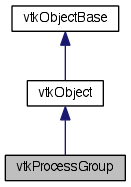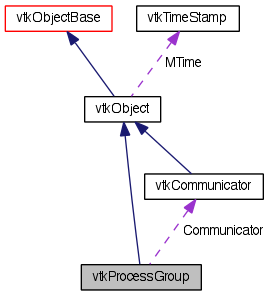A subgroup of processes from a communicator. More...
#include <vtkProcessGroup.h>


Detailed Description
A subgroup of processes from a communicator.
This class is used for creating groups of processes. A vtkProcessGroup is initialized by passing the controller or communicator on which the group is based off of. You can then use the group to subset and reorder the the processes. Eventually, you can pass the group object to the CreateSubController method of vtkMultiProcessController to create a controller for the defined group of processes. You must use the same controller (or attached communicator) from which this group was initialized with.
- See also:
- vtkMultiProcessController, vtkCommunicator
- Thanks:
- This class was originally written by Kenneth Moreland (kmorel@sandia.gov) from Sandia National Laboratories.
- Tests:
- vtkProcessGroup (Tests)
Definition at line 56 of file vtkProcessGroup.h.
Member Typedef Documentation
| typedef vtkObject vtkProcessGroup::Superclass |
Reimplemented from vtkObject.
Definition at line 59 of file vtkProcessGroup.h.
Constructor & Destructor Documentation
| vtkProcessGroup::vtkProcessGroup | ( | ) | [protected] |
| virtual vtkProcessGroup::~vtkProcessGroup | ( | ) | [protected, virtual] |
Member Function Documentation
| static int vtkProcessGroup::IsTypeOf | ( | const char * | name | ) | [static] |
Return 1 if this class type is the same type of (or a subclass of) the named class. Returns 0 otherwise. This method works in combination with vtkTypeMacro found in vtkSetGet.h.
Reimplemented from vtkObject.
| virtual int vtkProcessGroup::IsA | ( | const char * | name | ) | [virtual] |
Return 1 if this class is the same type of (or a subclass of) the named class. Returns 0 otherwise. This method works in combination with vtkTypeMacro found in vtkSetGet.h.
Reimplemented from vtkObject.
| static vtkProcessGroup* vtkProcessGroup::SafeDownCast | ( | vtkObjectBase * | o | ) | [static] |
Reimplemented from vtkObject.
| virtual vtkObjectBase* vtkProcessGroup::NewInstanceInternal | ( | ) | const [protected, virtual] |
Reimplemented from vtkObject.
| vtkProcessGroup* vtkProcessGroup::NewInstance | ( | ) | const |
Reimplemented from vtkObject.
| static vtkProcessGroup* vtkProcessGroup::New | ( | ) | [static] |
Create an object with Debug turned off, modified time initialized to zero, and reference counting on.
Reimplemented from vtkObject.
| virtual void vtkProcessGroup::PrintSelf | ( | ostream & | os, |
| vtkIndent | indent | ||
| ) | [virtual] |
| void vtkProcessGroup::Initialize | ( | vtkMultiProcessController * | controller | ) |
Initialize the group to the given controller or communicator. The group will be set to contain all of the processes in the controller/communicator in the same order.
| void vtkProcessGroup::Initialize | ( | vtkCommunicator * | communicator | ) |
Initialize the group to the given controller or communicator. The group will be set to contain all of the processes in the controller/communicator in the same order.
| virtual vtkCommunicator* vtkProcessGroup::GetCommunicator | ( | ) | [virtual] |
Get the communicator on which this group is based on.
| void vtkProcessGroup::SetCommunicator | ( | vtkCommunicator * | communicator | ) |
Set the communicator. This has the same effect as Initialize except that the contents of the group will not be modified (although they may be truncated if the new communicator is smaller than the current group). Note that this can lead to an invalid group if there are values in the group that are not valid in the new communicator.
| virtual int vtkProcessGroup::GetNumberOfProcessIds | ( | ) | [virtual] |
Returns the size of this group (the number of processes defined in it).
| int vtkProcessGroup::GetProcessId | ( | int | pos | ) | [inline] |
Given a position in the group, returns the id of the process in the communicator this group is based on. For example, if this group contains {6, 2, 8, 1}, then GetProcessId(2) will return 8 and GetProcessId(3) will return 1.
Definition at line 93 of file vtkProcessGroup.h.
Get the process id for the local process (as defined by the group's communicator). Returns -1 if the local process is not in the group.
| int vtkProcessGroup::FindProcessId | ( | int | processId | ) |
Given a process id in the communicator, this method returns its location in the group or -1 if it is not in the group. For example, if this group contains {6, 2, 8, 1}, then FindProcessId(2) will return 1 and FindProcessId(3) will return -1.
| int vtkProcessGroup::AddProcessId | ( | int | processId | ) |
Add a process id to the end of the group (if it is not already in the group). Returns the location where the id was stored.
| int vtkProcessGroup::RemoveProcessId | ( | int | processId | ) |
Remove the given process id from the group (assuming it is in the group). All ids to the "right" of the removed id are shifted over. Returns 1 if the process id was removed, 0 if the process id was not in the group in the first place.
| void vtkProcessGroup::RemoveAllProcessIds | ( | ) |
Removes all the processes ids from the group, leaving the group empty.
| void vtkProcessGroup::Copy | ( | vtkProcessGroup * | group | ) |
Copies the given group's communicator and process ids.
Member Data Documentation
int* vtkProcessGroup::ProcessIds [protected] |
Definition at line 126 of file vtkProcessGroup.h.
int vtkProcessGroup::NumberOfProcessIds [protected] |
Definition at line 127 of file vtkProcessGroup.h.
vtkCommunicator* vtkProcessGroup::Communicator [protected] |
Definition at line 129 of file vtkProcessGroup.h.
The documentation for this class was generated from the following file:
- dox/Parallel/Core/vtkProcessGroup.h
 1.8.0
1.8.0